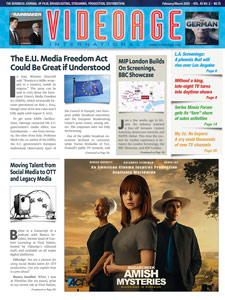To the Hollywood studios, markets such as NATPE offer an opportunity to explore how content can maintain value on multiple platforms. As a top-level studio executive explained: “The studios will always produce good content, the question is how we can preserve its value across platforms in an increasingly converging media environment.”
In practical terms, this “value preservation” can be achieved by studios requiring buyers to accept “elasticity in pricing related to windowing,” meaning that current windows have to be shortened and in certain cases license fees increased so that previous windows are not penalized. For example, by shortening the transactional VoD window and pressuring the subsequent premium window to increase its cost to consumers, both windows wouldn’t lose their strategic advantages and the studios would preserve value across multiple platforms.
At the same time, the entire industry at the studio level is grappling with questions about when, how and if to strengthen digital platforms by supplying content. Companies want to make sure they are not sacrificing profits in a rush to embrace digital platforms.
Last November, Warner Bros. announced that it will invest more on digital platforms and hold back more of its TV series for longer on its own platforms before selling them to streaming services.
The Los Angeles Times quoted a media analyst saying, “you can’t jeopardize your entire business for the next five years just to make Wall Street happy next quarter.” Similarly, Twentieth Century Fox stated that it doesn’t want to chase a short-term target.
This reflects a change of strategy, since streaming services such as Netflix and Amazon have changed their production business model. While in the past they where happy to pay for the full cost of production and retain only the SVoD rights for the territories in which they operated, nowadays they keep all rights for at least five years. After that window, the services will assign worldwide rights to a distributor, possibly associated with the production.
Under this model, the studios will become a hired hand, which they justify because this added production ensures the machine isn’t idle.
Meanwhile, at last November’s American Film Market conference on “Current Issues in Film Finance,” former Universal Pictures chairman David Linde said: “The film business needs to more aggressively accommodate what the audience is asking. We remain constricted by windows.”
Currently, windowing tends to follow the following schedule:
TVoD: six months
Premium: 15 months
Cable: 24 months
TFA: three years
But Belinda Menendez, president of NBCUniversal International Distribution and Networks, pointed out that TVoD and Premium windows are slightly earlier.
She then explained, “TV series typically have a 12-month window during which to monetize both linear and transactional prior to SVoD. For movies, Pay1 and Pay2 windows are shortening and tend to start earlier.
“The traditional linear Free and Pay models continue to deliver the bulk of our distribution revenue internationally. That said, we are working with all SVoD platforms — both global and local — as we believe that a healthy ecosystem is good for everyone and ultimately means we can reach more consumers with our product than we ever could before,” she said.
“New, early electronic sell-through (EST) windows [to offset DVD decline] at higher price point are a driver, helping to create high demand. As always, first windows are exclusive and, therefore, more expensive than second windows,” said Menendez.
Ben Pyne, president, Global Distribution at Disney Media Distribution, stated: “It is critical that as an industry we look to innovative distribution and monetization models in order to meet the ever-evolving needs of viewers.”
In addition, Pyne explained that Disney/ABC have “unique windowing strategies that not only maximize overall exposition and revenue for our content, but also super-serve consumers. This has been our strategy for more than a decade since we teamed with Apple to make television episodes available to viewers on the video iPod the day after their television debut.”
He added, “We have made our shows available on screens around the world within hours of its U.S. broadcast — and sometimes simultaneously or even before their U.S. premiere.” Pyne concluded: “We are excited about newer platforms that have been added to our portfolio like WATCH apps, as well as services like ABC Studios on Demand and Hot From the U.S. that have rolled out around the globe.”
CBS Studios International is managing pricing and new pricing models relative to revised digital windowing “very carefully,” according to Barry Chamberlain, CBSSI president.
“The licensing business is evolving very rapidly with the increased platforms for distribution and the change in viewing habits. Thankfully, premium content from both CBS [TV network] and Showtime remain in high demand across all digital and linear platforms.”
He continued: “We don’t have hard and fast rules about windowing our content and we think it is a mistake to say that one size fits all. Not all product is equally valued across the various platforms/windows. We at CBSSI are actively promoting a healthy ecosystem of licensing where traditional legacy businesses evolve toward a multi-platform offering and digital players increasingly focus on targeted projects that appeal to their subscribers. In the end, we hope this flexible strategy is the most effective and efficient manner.”
Jonathan Ford, executive vice president, Sales and Distribution, Content Television and Digital, places the subject of windowing at the top of the issues that will dominate NATPE 2016. Describing it as “both one of the key issues and one of the key opportunities for international distributors, the need is for a robust windowing process to meet the needs of all platforms and territories. There is such a diverse variety of channels and platforms acquiring content — often with their own multiplatform offering,” he said.
“When this is combined with a full slate of multi-genre programming, which is increasingly crossing over between viewing platforms, then the need for efficient rights management becomes more vital than ever,” said Ford.
Windowing also tops the key NATPE issue list for Roxanne Barcelona, vice president at Filipino distributor GMA Worldwide. Barcelona foresees “a focus on how content is managed through the multiple platforms that continue to emerge on, seemingly, a daily basis. Even with the new technological developments, especially in the digital market place, it is still the case,” she insisted, “that content is king — but it is how this content is managed that is the vital question.”
By Dom Serafini (Bob Jenkins from London contributed to this article)
Audio Version (a DV Works service)












Leave A Comment